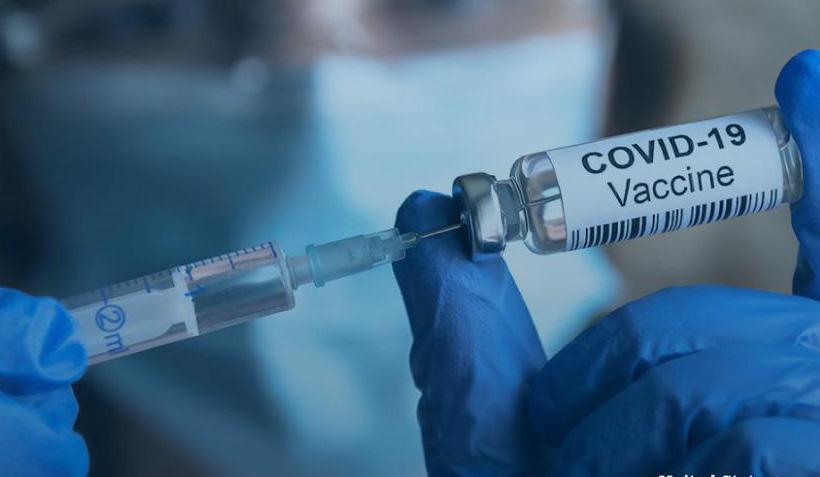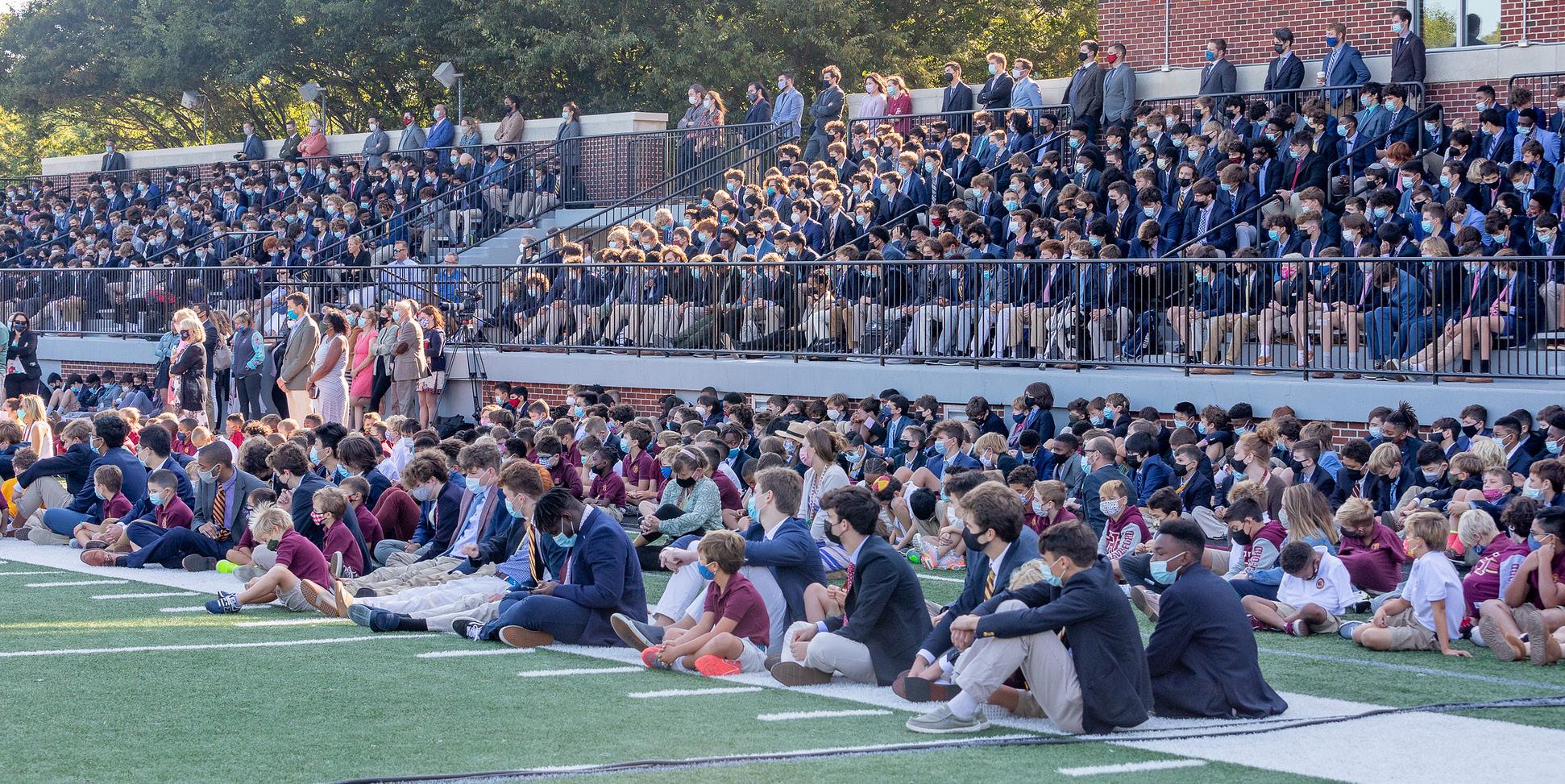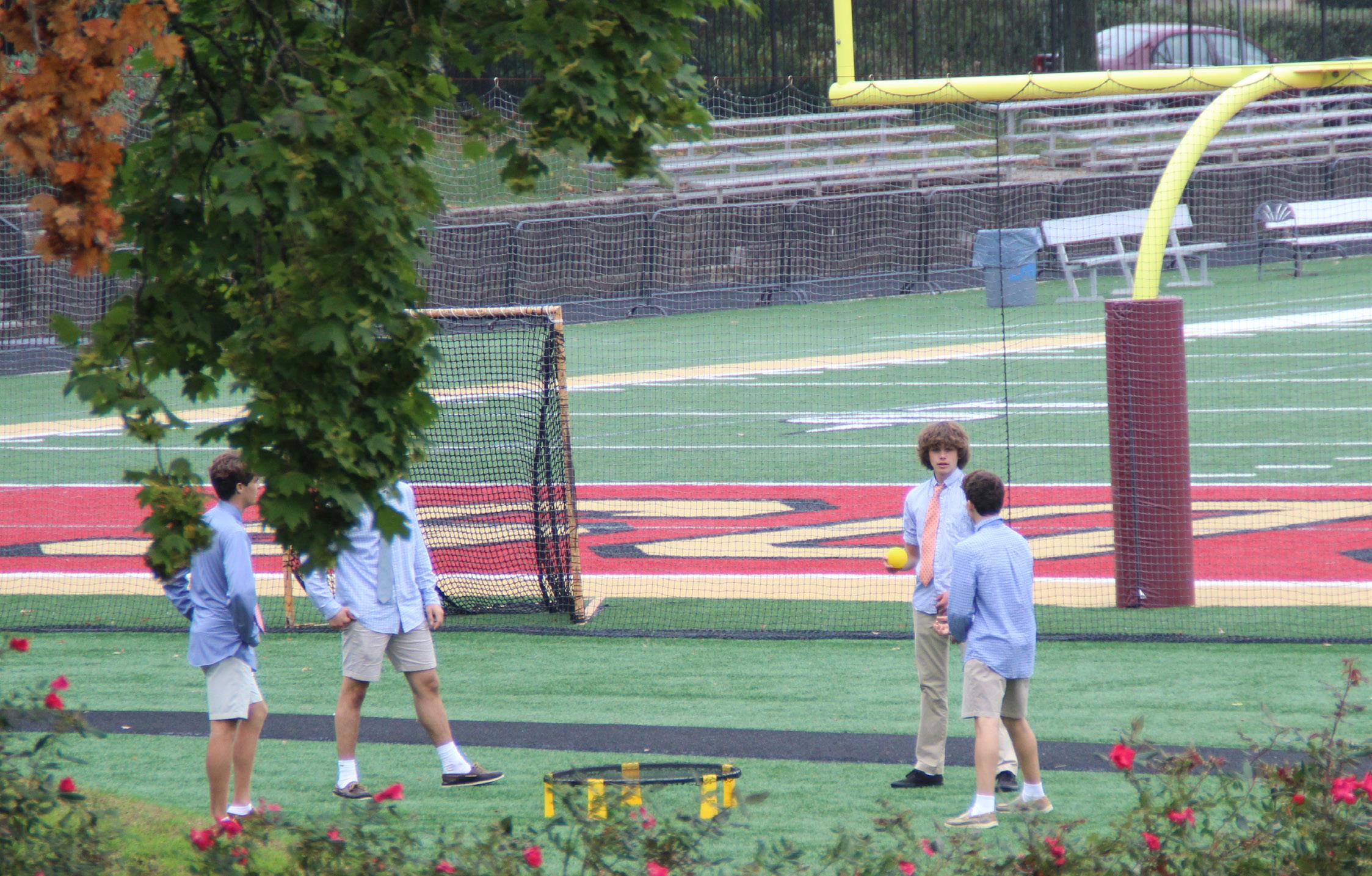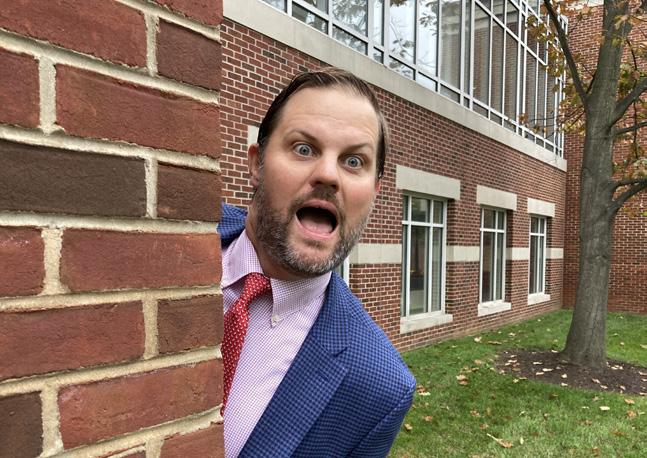
14 minute read
Fourth Formers in the Upper School
marked Penn Charter as the first school in the Inter-Academic League to require vaccinations for the student body. In a letter sent to the families of the students, the administration stated their reasoning:
“The Covid-19 vaccines have proven to be safe and also to be the most effective mitigation strategy in the battle against Covid-19. The highly contagious Delta variant, the anticipated surge in infections following the Labor Day holiday, and the recent authorization of the Pfizer vaccine by the U.S. Food and Drug Administration support strengthening this important layer of protection for our community. Increasing our vaccination rates schoolwide adds protection for unvaccinated lower school students and, given the incidence of breakthrough infections, to vaccinated students and adults.”
Advertisement
On a national scale, the vast majority of colleges and universities have chosen to require the COVID-19 vaccine. At first, many questioned the constitutionality of these mandates but Associate Justice Amy Coney Barrett reaffirmed a lower court’s ruling stating that there was no constitutional question in a university’s ability to mandate vaccines. Helen Rella, a workplace attorney at New York law firm Wilk Auslander, echoed Justice Barrett’s sentiment to CBC: “The [Equal Employment Opportunity Commission] has made clear that individuals can be required to take the vaccine as a term and condition of employment. That is subject to requests for accommodation based on medical reasons or sincerely held religious belief.”
So, if The Haverford School can require vaccination, should it?
This would not be the first time Haverford mandated vaccinations. Currently, Haverford mandates vaccines for Polio, Diphtheria, Tetanus, Pertussis, Measles, Mumps, Rubella, Hepatitis B, Varicella, and Meningitis. Although there are religious and health exemptions to these mandates as is required by law (there would be religious and health exemptions from a COVID-19 vaccine mandate as well), it is a right rarely exercised.
Currently, Haverford does not have a mandate for students, faculty, or staff.
Head of School Mr. Tyler Casertano thinks that the choice is very much a balancing act.
“The balance that we as a school have always been trying to strike [...] is both being medically responsible and also giving you all an engaging experience as possible [...] The question: how can we bring together 961 kids and 200 faculty and staff back together while also being responsible?” Mr. Casertano said.
With the help of his predecessor Dr. John Nagl, Mr. Casertano put in place a Reopening Task Force that worked over the summer break to craft guidelines which helped strike this balance. In creating these guidelines, the task force used national, statewide, and local case numbers as well as experts both within the Haverford community and outside the Haverford community.
Among the many precautions considered was a vaccine mandate for students and faculty. While a student mandate is still being considered, Mr. Casertano explained the relative futility of a faculty and staff mandate.
“One of the reasons we don’t have a faculty and staff vaccination mandate is because we are nearly all vaccinated. It would not have really accomplished much to have a mandate,” Mr. Casertano said. 97.3% of the Haverford faculty and staff is vaccinated, meaning that a mere 6 faculty members of the roughly 200 are unvaccinated.
As for a student mandate, much has changed since the task force released the official guidelines.
“The vaccine is through emergency status for the ‘16 and up’ age group. That changed our thinking a little bit,” Mr. Casertano said.
Though there is no official statistic on student vaccination, anecdotally, many upper school students have received both doses, and a majority have received at least a single dose. Although the task force published its guidelines in July, Mr. Casertano and Mr. Mark Thorburn, the Assistant Head of School and Task Force Chair, talk regularly about factors such as student vaccination rate and the efficacy of the guidelines against the ever-evolving pandemic.
Another element that has largely changed the pandemic since July has been the growth of the Delta variant. The Alpha variant, the originally predominant strain, is largely obsolete relative to the Delta variant, which has become the principal strain. This is due to its viral load, a measure of how much virus is contained within a given liquid measurement, being nearly 1,000x greater than the Alpha variant. The result is greater contagiousness.
The administration has not overlooked the effects of the Delta variant.
“We have been paying close attention to the pathology of the Delta variant and what is different and the benefits of vaccination vs the benefits of mask-wearing,” Mr. Casertano said. He believes that Haverford’s indoor mask mandate and social distancing requirements meet the standards for proper preventative measures against the Delta variant. A student vaccine mandate would be only a cherry on top, not the sundae itself.
Along with information directly related to the virus, there are also logistical matters to consider.
“I think for us, right now, because only a certain percentage of the population of the school can be vaccinated, it’s hard for us to draw certain lines,” Mr. Casertano said. “Especially in the middle school where there is a split population between that threshold of 12, it would be hard for us to have different policies for different kids, especially within a division.”
Another logistical matter considered was should there be a mandate, there are certainly students and families within the Haverford community that would object to the vaccine on moral or political grounds —reasons that are not recognized by law as legitimate objections. This leads to two different paths: either students and families leave Haverford or students comply and feel ostracized within their own community.
Mr. Casertano and the Task Force recognized this probability.
“We wanted to make sure that no one on this campus ever feels ostracized for their response to the preventative measures that we take,” Mr. Casertano said. “We understand that there are a variety of different responses to the disease, and we want to make sure that we as a community are able to have conversations with people about what they are feeling and where those views come from and how they intersect with our response.”
Although the administration’s current decision will likely stay in place until the end of the year, this has not stopped students from forming wildly different opinions on the question of a student mandate.
The disagreement was not over the efficacy of the vaccine—nearly all students agreed that it was an effective measure against the spread of the COVID-19 virus— but rather whether the mandate should be implemented. Many believe that it should be up to the students and their families to make decisions about their own health, while others believe it is a matter of public health that affects everyone’s safety and therefore is not a decision for any one person or family to make.
“Personally, I believe that The Haverford School should have a vaccine mandate, as it has scientifically been proven that the vaccine is safe by scientists working for the FDA and CDC,” an anonymous upper school student said. “A lot of people have benefited from the vaccine so the overall impact has been proven to be positive.”
Another student suggested that the student body and/or their parents should have a vote about a vaccine mandate, and a decision should be made from that data. However, a number of students feel differently.
“I feel like forcing someone to get vaccinated for something they may not necessarily need, say if they are a person who has recovered from COVID-19, [is wrong],” another anonymous Haverford student said.
Analysis across the board has shown that the vaccine is safe in the short term for nearly all recipients (certain exclusions like those who have endocarditis, myocarditis, etc. apply). Due to the virus’s novelty, the same claim cannot be extended to long-term effects as there is quite literally no way to study the effects of a vaccine that have not happened yet.
Still, the CDC recommends that all people get fully vaccinated regardless of their status as recovered patients of COVID-19. This recommendation is backed by studies such as the one at the University of Oxford in the United Kingdom, which determined that vaccinated individuals were much less likely to spread the virus even in the event of breakthrough infection.
Other data supporting the recommendation is not fully settled. The University of Chicago Medical School recently published a memo stating that while individuals who have recovered from COVID-19 do have antibodies in circulation, there is no research to determine that they are as effective as a vaccine itself. However, a study performed in Israel has provided evidence that COVID-19 antibodies were more effective than the vaccine at protecting against the Delta variant.
Another upper school student opposed to a student mandate quoted a study by the Mayo Clinic which found that the Moderna vaccine was only 76% effective against the Delta variant and the Pfizer vaccine a whopping 42% effective against the Delta variant —a nearly two-fold decrease. “Why should I be forced to take a vaccine that might not even work against the strain I am likely to get?” he asked. This student also pointed out that certain studies suggest that the Pfizer vaccine can be linked with a higher chance for appendicitis though he acknowledges that there is not enough evidence for this to be considered a scientific fact.
According to the CDC, scientists have been working for many years to develop vaccines against viruses like the one that causes COVID-19. This knowledge helped speed up the initial development of the current COVID-19 vaccines. Research into mRNA vaccine technology has been going on at high-level research institutions such as the University of Pennsylvania since before many current students were born.
Scientific data says that for the vast majority of the population vaccines are safe and
MR. TYLER CASERTANO
FIRST LAST ’2#
COVID-19 vaccine vial and syringe
FIRST LAST ’2#
U.S. CENSUS VIA WIKIMEDIA COMMONS

COMMUNICATIONS Vaccination rates allowed for the Opening Day Ceremony on September 10, 2021
A vaccine mandate? cont. from page 4
that, even if you have had COVID-19 and developed antibodies, it is still a good idea to get the vaccine. In addition, many schools nationally and locally such as Penn Charter have taken the step to mandate vaccination. While there are many factors to consider within the Haverford community, many would argue that the safety provided by the vaccine trumps any counterargument.
This leaves the administration with a scientifically simple but philosophically complex choice: should The Haverford School implement a COVID-19 student vaccination mandate? This leaves the administration with a scientifically simple but philosophically complex choice: should The Haverford School implement a COVID-19 student vaccination mandate?
New and original clubs excited to restart
Jingyuan Chen ’23
As the lasting effect of the pandemic dwindles, extracurricular activities return to the school campus. Aside from the return of major clubs including Model UN, Speech & Debate, and Mock Trial, many upperclassmen, with support from teacher advisors, started their own clubs, further enriching the school curriculum outside the classroom.
Partnering with Mr. Keefe, Fifth Former Nathan Mirin founded the Classics Club to encourage the appreciation of classic literature.
“In the Classics Club, we read books— really old books. It's a club for fun, not high stress,” Mirin said. “For the selection of inclass readings, the English Department is phasing out some classics in favor of new books. It makes sense to do so during the pandemic, but if you still want to read a good classics book, the Classics Club offers

around
the corner

October 15 22 25 29
Both varsity soccer and varsity water polo play Germantown Academy at home, 4:00 p.m.
Varsity football plays Malvern Prep in the second home game of the season at 3:15 p.m.
The Service Board hosts its anual sign-up event during community block.
Sixth Formers dress in costumes for Halloween and display them at an Upper School assembly. Students play Spikeball during a clubs period
a relaxed curriculum for reading.”
Mirin shares his own experience with classic novels. He hopes to expand the community of readers at Haverford and spread the joy of reading.
“Sir Gawain and the Green Knight, Pride and Prejudice, these classics have been [read] thousands, no, millions of times. They are like time capsules,” Mirin said. “You can come here and you can hear stories thousands of years old. We get to see the first product; we get to see how things evolve. We can see not only how these books influenced our society, but how society influenced these books.”
Aside from the art of literature for intellectual improvements, athletics are also making a comeback.
“We're a brand new club, as we've only had one meeting so far. Our intention is to make boys more familiar with the sport of archery,” Archery Club’s teacher advisor Mr. Leech said.
“I was officially qualified as an archery coach, and I’ve taught it for over 12 years. I spent a lot of time teaching boys the fine skills of archery, whether that's in camps or club-based sessions,” Mr. Leech said. “Ryan Gibson, who's a student leader, approached me and asked me if I'd be happy to be the proctor, and it just seemed like a good idea to me.”
The Archery Club will host weekly meetings on the school campus for discussions concerning the sport, as well as special events to try out the sport at archery ranges.
“We are not going to do any archery on campus, but we look forward to the opportunity to go to some archery ranges after school or during weekends. It’s an early stage plan, but there are a few clubs around the area that we can reach out to,” Mr. Leech said.
Another Third Former, T.J. Romero, partnered with Dr. Gurtler to bring volleyball to the upper school.
“We have a very established volleyball program at the middle school. The club was started at the behest of the freshmen named T.J. Romero, who plays a lot of volleyball and wants to continue to play, so I offered to support him,” volleyball club advisor Dr. Gurtler said.
Adding on to student interests, Dr. Gurtler has been a great volleyball player herself since college. "I'm from a family that played a lot of volleyball. We were big supporters of our college team in my hometown. I had a mom who played Division I volleyball, and I played Division I and in Division III at Michigan State and at Wellesley College,” Dr. Gurtler said.
Dr. Gurtler adds how the volleyball club is an inclusive, intramural environment for all.
“We're playing during the meeting on Fridays. The meet-ups are for people who want to come out and learn a few skills as well as having fun,” Dr. Gurtler said. “During the first meeting, there were six of us who played, so we got to play three on three. People have hidden skills in volleyball, I was surprised to learn.”
As new clubs are established, Fifth Former Luca Sekulic and Sixth Former Aidan Boyle decide to revive an old club and continue its heritage.
“The lawn games club was originally founded by Grayson Walker, and we want to continue the idea that Haverford students can interact with each other not just academically, but in more physical and outdoor
JACK SUTER ’23
curriculums,” Sekulic said. “This is also an opportunity for everyone to take their masks off and participate in something that they love to do.”
The lawn games club creates an easy going atmosphere for all students.
LUCA SEKULIC ’23
“During our team meetings, we first gather in Ms. LaPenta’s room, get some donuts, and then head down to the baseball field. We take off our masks and play some spike ball, soccer, and baseball,” Sekulic said, “We're planning on bringing in more nets and having some tournaments. We're also planning to move to the wrestling room during winter because we want to continue playing and socializing.”
The club attracted the attention of many students as they flocked to attend the first meeting on Friday the first.
“In the first meeting we had over 3040 attendees,” Sekulic said. “We want this to become a part of our culture. We want it to continue on after the current leaders leave, and keep this opportunity for everyone to be together.”



